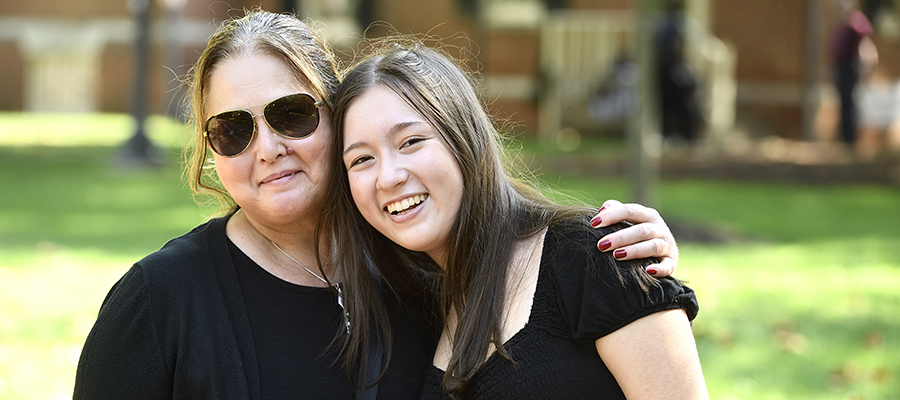Resources for Families

As a family member, you are undoubtedly invested in your student’s academic and personal success in college. You want to continue to have a major role in your student’s life, but you also know that your relationship will change as your Blue Jay grows and develops. There are many ways you can support your student at JHU.
First, you are your student’s biggest champion. The motivation and support you provide is essential. When your student encounters unexpected challenges, your encouragement will help them troubleshoot and persist.
Next, we encourage you to become a knowledgeable resource. When your Blue Jay reaches out for help, share some resources and services that may be able to help. Explore and learn more about many resources available to help your Blue Jay make the most of their Hopkins experience and the support services in place to help them when they encounter challenges. Review the information provided below, view answers to frequently asked questions, and visit our Blue Jay Family Connection portal. Finally, reach out if you are concerned about your student.
Resources
General Resources
- Academic Calendar: Select the appropriate school from the drop-down box. Homewood students (KSAS & WSE) fall under Arts and Sciences.
- Collegeparentsmatter.org: Information to aid parents and families in speaking with their student about drinking and related problems.
- Hotels in the Area
- Understanding FERPA
Academic Support
- Academic Advising
- Academic Support (Tutoring, study skills, consulting, and more)
- Admissions
- Global Education Office
- Homewood Registrar (KSAS and WSE)
- National Fellowships Program
- Student Disability Services
Student Life
- Arts and Innovation
- Center for Social Concern
- Fraternity and Sorority Life
- Gender and Sexuality Resources
- Hopkins Sports
- Leadership Engagement and Experiential Development
- Multicultural Affairs
- On-Campus Living
- Ralph S. O’Connor Center for Recreation and Well-Being
- Religious and Spiritual Life
- Student Engagement
- Student Government Association
- Women and Gender Resources
Student Services
- Center for Student Success
- First-Generation, Limited-Income Students
- Health Promotion and Well-Being
- Information Technology
- International Services
- J-Card
- Life Design Lab
- Mental Health Services
- Student Transitions and Family Engagement
- Primary Care
- Public Safety
- Student Accounts
- Student Financial Services
- Student Outreach and Support
- University Experiential Learning
Recommended Readings
- “Don’t Tell Me What to Do, Just Send Money” by Helen E. Johnson & Christine Schelhas-Miller
- “Empty Nest, Full Heart: The Journey from Home to College” by Andrea Van Steenhouse, Ph.D.
- “Letting Go: A Parents’ Guide to Understanding the College Years” by Karen Levin Coburn and Madge Lawrence Treeger, pub. Quill
- “Parents’ Guide to College Life: 181 Straight Answers on Everything You Can Expect Over the Next Four Years” by Robin Baskin
- “The iConnected Parent (Staying Close to your Kids in College (and Beyond) While letting them Grow up” by Barbara K. Hofer, Ph.D., and Abigail Sullivan Moore
- “You’re On Your Own (but I’m here if you need me)” by Marjorie Savage, pub. Simon & Schuster
Encouraging Independence
The transition from dependence to independence can be challenging for family members, especially those who have been highly involved in their student’s daily life throughout high school. This transition is also an adjustment for your Blue Jay. Many students will look to their families for support and guidance during this time.
Assuredly, your unconditional guidance and support has helped your Blue Jay to achieve their goals thus far and has prepared them to enter this next stage of life. We encourage you to talk with your student about the type of relationship and level of family involvement that feels right as they enter and move through college. Each family and family member will have a unique experience with this adjustment.
At JHU, students are held responsible for their academics, finances, physical and mental health, and more. Additionally, they are held accountable for their actions and decisions. Families can support their students through open communication, encouragement, and motivation. It is important to be involved in your student’s life and show concern, while also allowing your student to make their own decisions and focus on new responsibilities.
Recognizing Students in Distress
Reporting a Concern
While we encourage students to become independent and manage their own personal and academic affairs, the safety and security of our students is our utmost concern.
The Student Outreach and Support team is committed to assisting students in successfully navigating the Johns Hopkins University Homewood campus. SOS helps students manage physical and mental health concerns, personal and family emergencies, financial issues, and other obstacles that may arise during their college experience.
We encourage you to check in with your student regularly about their overall wellness and mental health. Encourage your student to get involved in activities that provide a healthy balance to the rigorous academic life at JHU. As a family member, you may be the first to notice changes in your student’s behavior. If you think your student may be in distress and need to see a counselor, please contact us. The following are signs of student distress:
- Behavioral or emotional changes
- Withdrawal from friends, family, and favorite activities
- Change in hygiene or public appearance
- Decline in academic performance
- Alcohol or drug abuse
- Talking or thinking about suicide
- Anxiety and fear
- Excessive anger
- Others feel worried about them
- Change in functioning (not attending class, not sleeping, sleeping too much)
- Wanting to harm self or others
- Apathy and indifference
- Feelings of worthlessness and hopelessness
